
More and more, society is moving towards a sharing economy. With the rise of companies like Uber and Airbnb, customers and companies are saving time and money on otherwise pricey services. Uber, for example, allows subscribers to skip the frequent long wait times for taxis and request a car to pick them up in minutes from their destination. Unlike traditional taxis, Uber drivers work similarly to independent contractors, they are drivers for hire. As such, using Uber can save consumers the cost of buying their own car, paying for gas and polluting the environment, while the company itself saves on purchasing its own fleet of cars to deliver the service.
But the sharing economy isn’t just for driving. It’s beginning to enter other industries as well. recently, The Conversation, an independent online publication that delivers news from the academic and research communities, boasts the following headline: “The sharing economy comes to scientific research.”
The article explains that since most science equipment is extremely expensive not all scientists readily have the funds to pay for the equipment. With the ever growing technology field, new devices and equipment are being created which could help scientists with their research. But the disconnect comes from not being able to afford the equipment. Not being able to do the research in turn causes a lack of funds for the research facility. This comes full circle because then scientists do not have the funding for the equipment. This circle of science problems is how a sharing economy relates to science and research. With a sharing economy, scientists are able to travel to a “resource lab” or look online to find the equipment they need to rent.
A resource lab is defined as a lab that specializes in a certain type of science. Researchers are able to request and purchase an experiment to be done at the lab. This saves the researcher the time to do the experiment and the money it costs to purchase the necessary equipment. Additionally, it prevents the researcher from having to learn a science that they are not familiar with or run extra trials because of missteps that occur. Because the resources labs specialize in the certain science, they are going to know a great deal more about the given subject and be able to run experiments more efficiently. If you want to be more involved with the experiment though, there are some remote online laboratories, run by MIT, that allow some control via the internet.
Resource labs are also able to bring in funds more quickly. The lab will be able to run the experiments more efficiently, which allows them to take on more projects, which will yield more funds. These funds can then be put back into the lab to buy more equipment to be used. Additionally, collaboration among scientists, is a benefit of this sharing economy. The resource labs connect scientists from all areas of study, where they are able to come together and do research.
Besides academic research, eight of the top 10 pharmaceutical companies use resource labs and “Science Exchange” to outsource experiments. This has brought in additional funds to these labs. In the past years, one lab saw a rise of 500 percent and raised $25 million which they used to expand. A sharing economy is continuing to grow but I think it will really add to the science and research industry if it continues to grow.
Source:
https://theconversation.com/the-sharing-economy-comes-to-scientific-research-55368